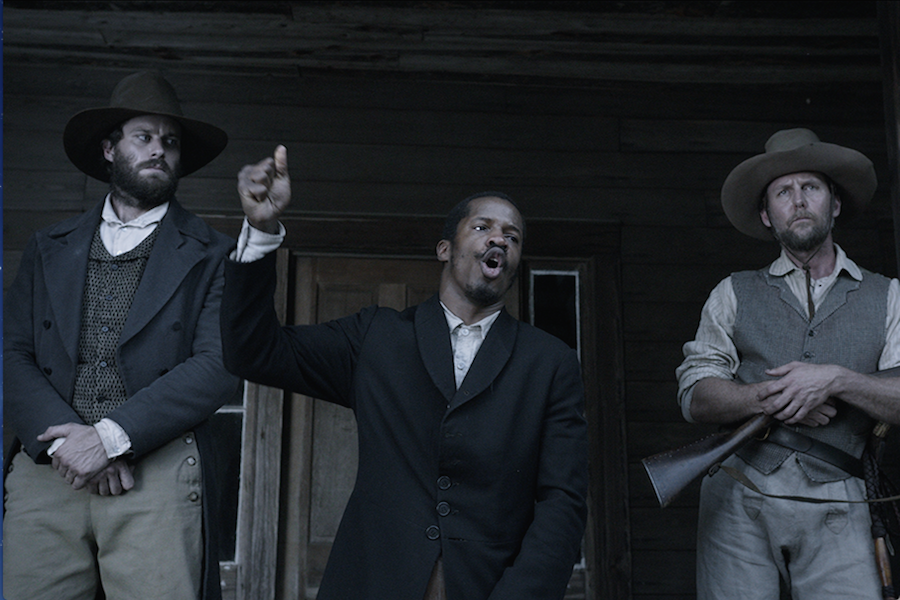OCTOBER 9, 2016
This is a really tough film to review, as it comes with an uncommon amount of baggage.
Nate Parker’s “The Birth of a Nation,” which opened nationwide in theaters on Friday, has had a roller-coaster ride on its way to your cinema.
The film premiered in Sundance in January to nearly virtually universal acclaim. Distributors were all over themselves to try to seal the deal to distribute the film. Netflix offered a record (for Sundance) $20 million to get the rights, but Parker chose to go with the lower $17.5 million bid by Fox Searchlight because that studio had demonstrated their ability to maneuver through the very complicated Oscar race with their campaign for “12 Years a Slave”, a similarly-themed but very very different kind of movie that the studio had led to a Best Picture win. (And given the Oscars’ problem last year with #OscarsSoWhite, “The Birth of a Nation” promised to be the ideal solution to the Academy’s dilemma.)
From all reports, Fox Searchlight had planned a campaign similar to one that United Artists did in 1976 for Sylvester Stallone for “Rocky” — a struggling young journeyman actor who had success in Hollywood, as Parker had with “Non Stop” and especially 2014’s terrific “Beyond the Lights,” working for years to try to realize his dream project of bringing to life the real-life story of Nat Turner and his slave rebellion. Perfect.
Then reality hit.
News broke in August that, in 1999, when Parker was a student at Penn State, he and fellow wrestler Jean McGianni Celestin (who shares a story credit on “The Birth of a Nation”) were accused of raping a fellow Penn State student who later admitted that she was intoxicated and unconscious and was not sure about how many people were involved in the rape. The case was brought to trial, and Parker was acquitted of all charges. Celestin was convicted, but that ruling was overturned in 2005. From all reports, Fox Searchlight was aware of Parker’s past and bought the film anyway.
But they didn’t know this.
Apparently in 2012, the female victim in the case committed suicide. It’s not clear whether the woman killed herself because of the rape or because of some other factors, but, to put it crassly, it definitely cast a pall over Fox Searchlight’s planned underdog campaign for Parker. But they believe in the film and are going forward with its awards campaign anyway..
Have we not mentioned the movie? Let’s get into the film itself.
Parker takes the lead role as Nat, born to a family of slaves working for the Turner family. As a boy, Nat becomes fast friends with the Turners’ son Samuel, a friendship that continued into adulthood. Samuel’s progressive mother Elizabeth (Penelope Ann Miller) taught Nate how to read, but only the Bible, since all the other volumes in the house “full of stuff that your kind wouldn’t understand.” Nonetheless, the Bible instills in Nat a love of religion, and when he becomes an adult, that develops into a passion for preaching. With permission of the adult Samuel (Armie Hammer), who now runs the plantation, Nat travels the area preaching the word of God. (Of course, the money he receives for preaching goes straight into Samuel’s pocket.)
But traveling throughout the county, Nat witnesses a side of life that is very different than what he’s seen on Samuel’s plantation. He learns for the first time of how deprivations and torture of slaves are just a apart of everyday life all around him. Eventually Nat is radicalized and, using his knowledge of Scripture, begins to use his sermons to urge his slave audience to rise up against the injustice all around them.
Part of the oppression of slave life was how masters used sexual violence against their female slaves, and here’s where seeing “The Birth of a Nation” gets a little dicey. You can watch Woody Allen’s “Café Society” or rewatch Roman Polanski’s “Rosemary’s Baby” and not be reminded of those filmmakers’ sexual past because their films are not about that Not so with this film. A large part of Nat’s revenge motivation is to avenge two sexual attacks, first on this wife Cherry (Aja Naomi King) by a group of white men, led by a slavecatcher (Jackie Earle Haley), and the second against his best friend’s wife Esther (Gabrielle Union, an actress who has previously been the victim of sexual violence herself) who is ordered by Samuel to come to the big house to have sex with a guest at his dinner party.
So yes, there are many many tough moments in “The Birth of a Nation,” as there were in “12 Years a Slave.” If you choose not to see the film, either because of the kinds of scenes that I’ve described or you don’t want to give your money to Nate Parker, I have no problem with that. But there are many passages in “The Birth of a Nation” that are absolutely thrilling. The momentum that Parker, who also directed and co-wrote the film, manages to achieve in the scenes of the actual violent rebellion against slaveowners into which Nat leads his fellow slaves, is, I suspect, part of the reason for the critical and audience acclaim at Sundance.
“The Birth of a Nation” is particularly assured and impressive as a first film, though Parker at times does indulge himself in some rookie mistakes. The dialogue at times can be ponderous and the imagery pretentious (did we really need to see an ear of corn that is oozing blood?).
But if you’re the kind of moviegoer who can manage to separate a film from the its makers’ personal life, “The Birth of a Nation,” as uneven as it is, delivers a powerful retelling of a story that needs to be retold.
GRADE: B












